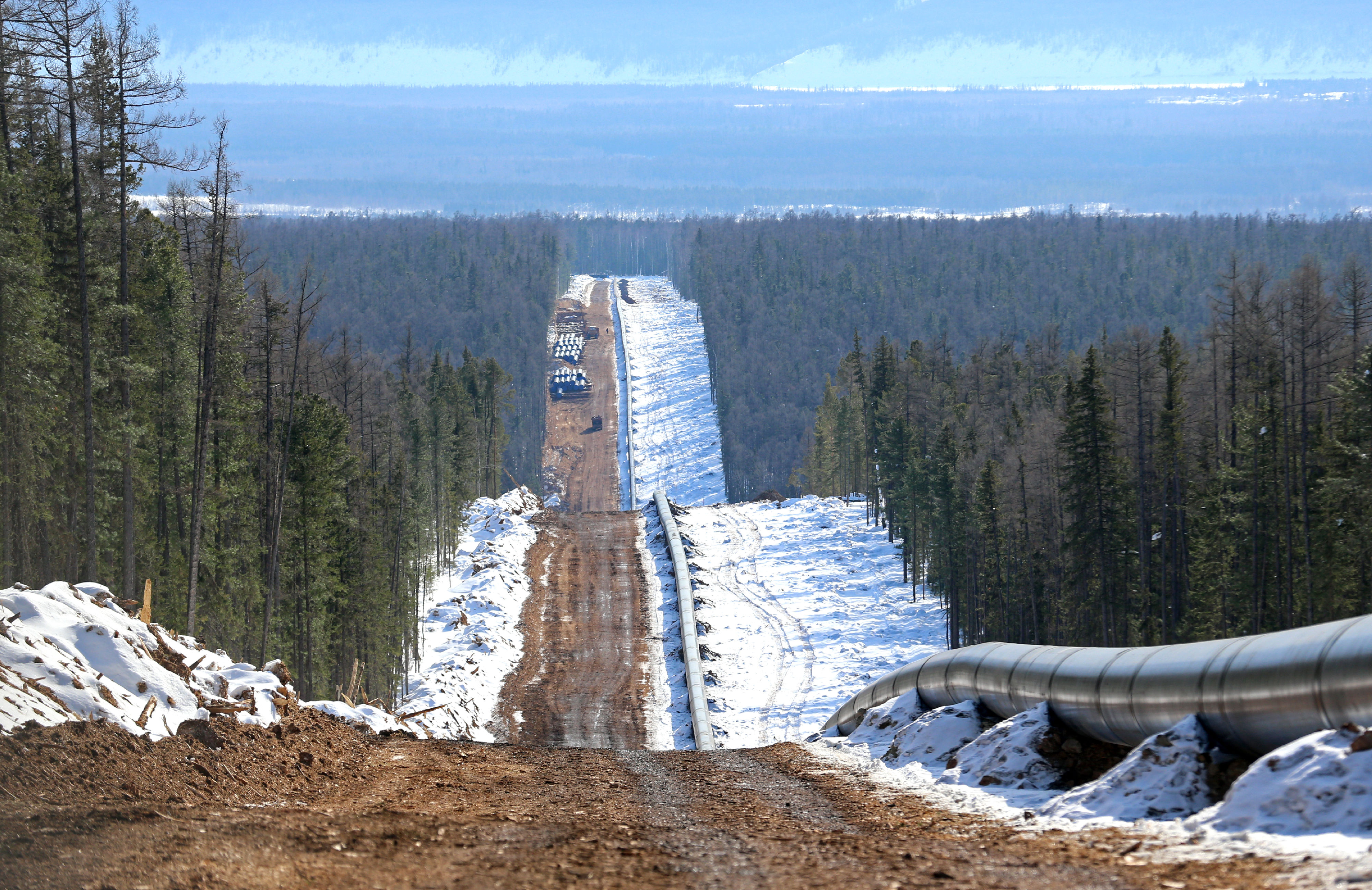Russia's Weaker Hand Undermines Case for Power of Siberia 2 Gas Pipeline to China
(Reuters) — Russia is counting on a planned new pipeline to China as it seeks to make up for lost gas sales in Europe, but industry insiders see major risks around the project and question whether it will justify the huge costs.
Russia has been in talks for years about building the Power of Siberia-2 to carry 50 billion cubic meters (Bcm) of natural gas a year from the Yamal region in northern Russia to China via Mongolia — almost as much as the now idle Nord Stream 1 pipeline under the Baltic Sea that was damaged by explosions last year.
The plan has gained urgency as Moscow aims to double its gas exports to energy-hungry China to make up for the collapse of its exports to Europe following the war in Ukraine. But agreement on key issues including pricing remains elusive.
China's President Xi Jinping told Russian President Vladimir Putin in Beijing this month that he hoped the China-Mongolia-Russia gas pipeline will make substantive progress as soon as possible, yet nothing has been formally agreed between the two countries.
Russia currently exports gas to China through the Power of Siberia 1 pipeline, which began operating in 2019 and runs through eastern Siberia into China's northeastern Heilongjiang province.
Experts say that as China is not expected to need additional gas supply until after 2030 Beijing could drive a hard bargain on price for a second pipeline via Siberia.
Moscow has not said how much the 2,600 km (1,616 miles) Power of Siberia-2 would cost or how it would be financed. Some analysts have put the cost at up to $13.6 billion.
"There are too many risks, not least political ones. It's too dangerous to depend on a single buyer which may change its decision to buy the product from you any time," said a Russian industry source familiar with the talks.
Russia aims to increase supplies via Power of Siberia 1 to 38 Bcm annually by 2025.
If the plans for Power of Siberia 2 and another link from Russia's far eastern island of Sakhalin come to fruition, Russia's pipeline gas exports to China would rise to almost 100 Bcm per year by 2030.
That's around half of Russia's annual exports to Europe at the peak reached in 2018 and compared to a combined capacity of 110 Bcm of Nord Stream 1 and 2.
Russia, however, expects the price of its pipeline gas for China to steadily decline over the next few years, according to a government document, and be much lower than prices for sales to Europe - which before the war in Ukraine accounted for 80% of Russian gas exports.
The Russian economy ministry has not responded to a request for comment on the document published last month.
The document sees the price of Russian pipeline gas for Turkey and Europe falling to an average $501.60 per 1,000 cubic meters this year and to $481.70 in 2024 from $983.80 in 2022.
For China, it expects the price to average $297.30 in 2023 and $271.60 in 2024.
Dependent on One Buyer
Russia said in March that state gas giant Gazprom, which will operate Power of Siberia-2, was finalizing contract terms with China's top oil and gas major CNPC.
Gazprom began a feasibility study on the project in 2020 and has said it aims to start delivering gas by 2030. It did not reply to a request for comment on the cost of the project.
Dmitry Kondratov from the Economics Institute at the Russian Academy of Science said the project is also undermined by extra costs related to the need to transport gas across China to end-users once the gas reaches China.
"Transportation costs for the Chinese side... will be approximately $270 per 1,000 cubic meters, therefore, if the Russian side does not provide price discounts, then the prospects for the construction of this gas pipeline until 2030 remain quite pessimistic," he wrote in a note this month.
"This fact will require CNPC to build on its own all the necessary gas transportation infrastructure in China," Kondratov wrote.
Sergey Vakulenko, non-resident fellow at the Carnegie Endowment for International Peace, said the project might "leave Gazprom in the red after transportation costs".
"It will also make Gazprom dangerously dependent on one buyer, which will be able to not only dictate the terms of the contract, but also demand changes to those terms in future," Vakulenko, who has experience of working for Gazprom companies, wrote in a note in June.
Russian Deputy Prime Minister Viktoria Abramchenko was quoted as saying this month that construction on the Soyuz Vostok gas pipeline, the Mongolian portion of Power of Siberia-2, could start in the first half of next year.
In February 2022, Beijing also agreed to buy gas from Russia's Sakhalin island, to be transported via a new pipeline across the Japan Sea to China's Heilongjiang province, reaching up to 10 Bcm a year later this decade.
But Russia is also jostling with other competitors to sell gas to China, including Turkmenistan and providers of sea-borne LNG from the United States, Qatar and Australia — further strengthening Beijing's bargaining power.
Related News
Related News

- Keystone Oil Pipeline Resumes Operations After Temporary Shutdown
- Freeport LNG Plant Runs Near Zero Consumption for Fifth Day
- Biden Administration Buys Oil for Emergency Reserve Above Target Price
- Mexico Seizes Air Liquide's Hydrogen Plant at Pemex Refinery
- Enbridge to Invest $500 Million in Pipeline Assets, Including Expansion of 850-Mile Gray Oak Pipeline





Comments